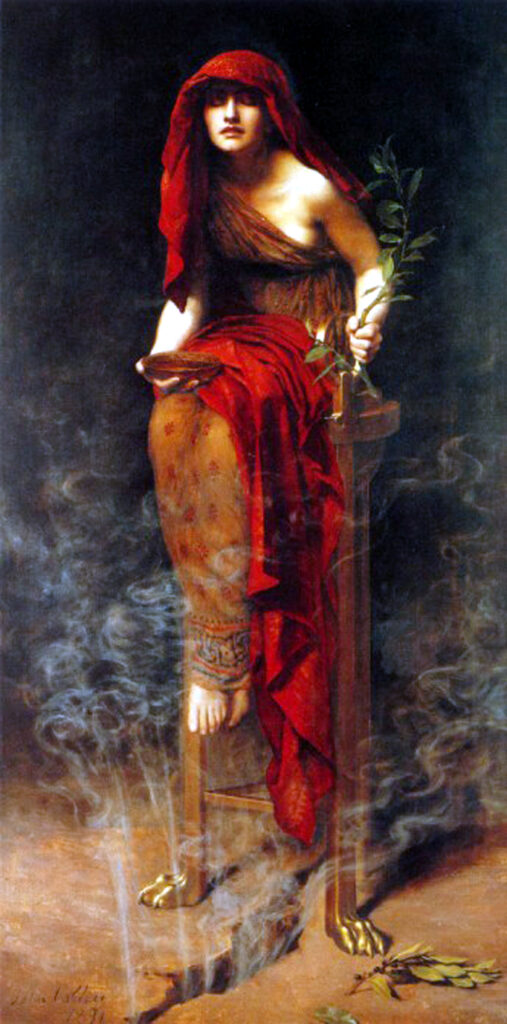
Pythia, is known worldwide as the mysterious woman who gave oracles at Delphi in ancient Greece and her words were respected and feared by all Greeks. Actually, Pythia was not the name of one sole woman but the title of a number of women who served that office. It derives from ancient greek “pinthanomai” (πυνθάνομαι) which means to find out, but also to the Python, the sacred snake guardian of Delphi which, like all snakes, was a symbol of wisdom and secret knowledge. Snakes live in the earth, and in Greek mythology. Python was son of Gaia (Γη) which means Earth (geometry, geography, geology).
Gaia was the mother-earth goddess, the mother of all and through the snake she communicated wisdom to the people. When the Python was slain by Apollo the successor patron god of Delphi, the wisdom of Gaia was transferred to the Pythia, through a chasm in the earth which emanated vapours. Pythia was seating on a tripod τρίποδα (tria podia = three feet), a three-legged chair over the chasm and inhaled those vapours being possessed by the divine spirit. This state of mind was known as mania μανία (madness), hence the word mantis (μάντης) which means seer and manteion (μαντείον), the oracle (chiromancy, a modern form of divination by reading the palm (chir – χέρι). In English mantis is mostly known as the praying insect, a name inspired in the religious property of pythias. Like mantis, a prophet literally means the one who speaks before (pro before, fimi φημί – speak, like fame (φήμη), which is what is spoken about someone). In sacred mania were also the maenads, the drunk followers of the wine-god Dionysus. This kind of situation was also known as enthusiasm, which literally means to have the god inside (en – theo), – theo meaning god (atheist, pantheon, theology), that is possessed by the divine spirit.
All this makes clearer why Delphi was called the navel of the world. Just like the navel connects a mother to her child, this chasm connected the earth Gaia to her children, the people, offering them her wisdom in such mystic way. In fact, the word Delphi itself means, womb, alluding to this mother-child connection. Adelphos (αδελφός) in greek means brother, as brothers derive from one same womb (a-delphi). Philadelphia (Φιλαδέλφεια) also derives from this root and means to love the brother, brotherhood. It was originally established as a title (Philadelphos) to the Hellenistic kings when, by form of exception, they shared good relations to their brothers. To honour the greek cities took their names, like it happened with Alexander (Alexandria), Antiochos (Antiochia) and others.
by Elena Soulioti , Licenced Tourist Guide – Archaeologist